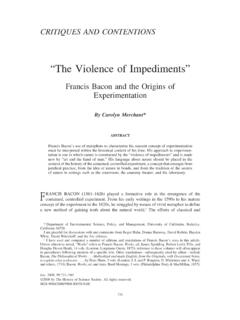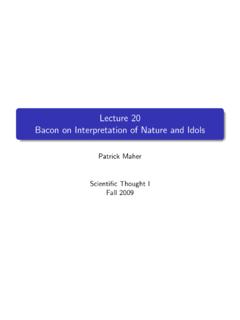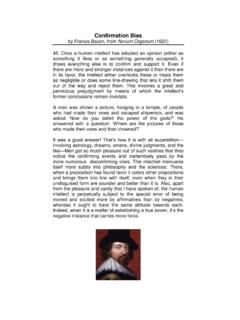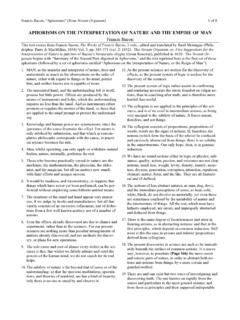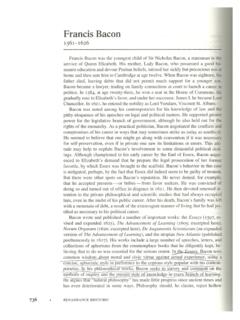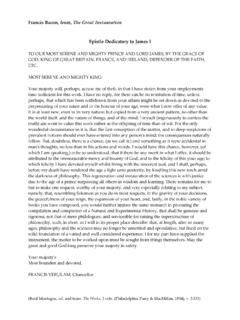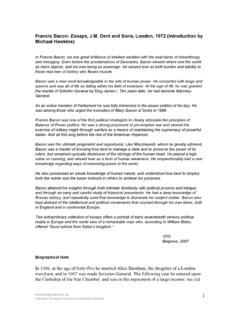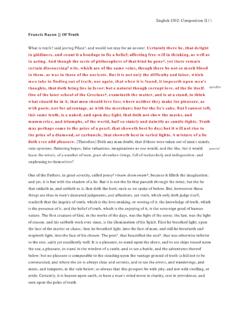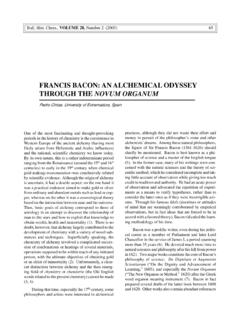Transcription of The EXPERIMENTAL PHILOSOPHY: Francis Bacon (1561-1626 …
1 1 The EXPERIMENTAL philosophy : Francis Bacon (1561-1626 AD)One of the most remarkable products of the reaction against Aristotelian philosophy , in the form that was handeddown by late Mediaeval philosophers, was the rise of an entirely new philosophical system which came to be called Empiricism . This was particularly associated with British philosophers, and was both instrumental in the rise ofmodern science, and a by-product of it. Its first major exponent was Francis Bacon - although he was certainlyinfluenced by earlier ideas (for example, from Roger Bacon ) his ideas were very new in many cases, and had a verylarge influence on later work by British scientists.
2 Later on Locke (a friend of Newton s) took it much further, andsubsequently Berkeley and Hume took the whole idea of empiricism to an extreme. Although Bacon s contributionwas the earliest and in some respects the crudest approach, in some ways it was the most durable, and certainly ithad the largest impact on the development of of Francis BACONF rancis Bacon was born in London on January 22, 1561, at York House off the Strand. He was the younger oftwo sons of Sir Nicholas Bacon , a successful lawyer and Lord Keeper of the Great Seal under Queen Elisabeth mother Anne was a scholar, daughter of Sir Anthony Cooke, who translated ecclesiastical material from Italianand Latin into English; she was also a zealous Puritan.
3 Bacon s father hoped Francis would become a diplomat andtaught him the ways of a courtier. His aunt was married to William Cecil, later to become Lord Burghley, the mostimportant figure in Elisabeth s government. Thus from a very early age Bacon was immersed in the affairs of April 1573, at age twelve, Bacon was sent to study in Trinity College, Cambridge, where he was under the specialcare of the Master of the college, John Whitgift (who later became Archbishop of Canterbury). He found himself amidst men of sharp and strong wits, and abundance of leisure, and small variety of reading, their wits being shutup in the cells of a few authors, chiefly Aristotle, their dictator.
4 And knowing little history, either of nature ortime, did, out of no great quantity of matter, and infinite agitation of wit, spin cobwebs of learning, admirable for thefineness of thread and work, but of no substance or profit. After only 32 months at Cambridge, Bacon left the college at Christmas 1575, just before his 15th birthday. Thenominal reason was the outbreak of plague, but as he later told his chaplain William Rawley (his first biographer) hewas also glad to leave, heartily fed up with the academic life and with the central core of Aristotelian philosophy inthe s first major setback occurred on 22 Feb 1579, when he was 18 yrs old, and his father died suddenly.
5 Baconwas the 2nd son of a 2nd marriage by Sir Nicholas, who just before his death had arranged for parts of his estate tobe given to his first 5 sons, but had yet to arrange for Francis . Francis suddenly found himself almost penniless, andin need of a career. This he achieved with remarkable success and speed; he trained as a lawyer, graduating fromGrays Inn in 1582, becoming a reader (the equivalent of a lecturer) in 1588, and rising to the high position of DoubleReader in 1600, a remarkable achievement at his age. At the same time he began a parliamentary career in 1581 atthe age of 23, becoming member of parliament for Bossiney in rapidly became one of the leading lawyers in England, thus eventually earning the queen s notice.
6 Howeverin 1593, while in a position to obtain high office under Queen Elizabeth, he criticized a taxation policy in Parliament,and opposed it in the vote. This destroyed any chance he might have had for either the position of Attorney Generalor Solicitor General under Elizabeth. Bacon was under the patronage of the Earl of Essex, who was for a time lookedupon with favor by the queen (indeed, for a time was her lover). Essex was very well-disposed towards Bacon , evengiving a substantial estate to his friend once he realised that Elisabeth still distrusted him. A few years later, fortunesreversed completely for Essex; he plotted against the Queen, was accused of going against her orders, and eventuallywas brought to trial and executed.
7 In a remarkablevolte face, Bacon acted as prosecutor, an action which earned himthe lasting distrust of many of his contemporaries. Bacon later defended his own actions in An Apology in CertainImputation Concerning the late Earl of Essex .With the death of Elizabeth in March 1603, and the succession of James I, Bacon s fortunes changed. He wasquickly established as solicitor general, later achieved the position of attorney general, and eventually took over hisfather s old position of the Lord Keeper of the Great Seal. Bacon rose in rank again when a long time rival, SirEdward Coke, was removed from his position after refusing to force a confession out of a prisoner and pronounce him2guilty.
8 In 1602, Bacon was knighted, and in 1605 he married Alice Barnham, the daughter of a London alderman. In1618 he was appointed as Lord Chancellor; and later that year, at the age of fifty-seven, he was ennobled as BaronVerulam. Finally, in 1621, he was made Viscount St. Albans. At this time Bacon , at the height of his powers, waswidely admired for his legal skills, if not as a moral paragon. His reputation was that of a man with a remarkablemind, of forensic analytic and political skills, who was however content to act as a conscientious and deferential toolfor his political , the same year as he was made a baron, he was charged with accepting bribes, tried and found reality Bacon s offense was small (he even found guilty the two men who had paid him off) but he ultimatelybecame a scapegoat, sacrificed by King James and by Buckingham to appease a parliamentary opposition.
9 Hisoffices were taken from him and he was fined 40,000 pounds (a huge sum in those days), as well as being sentencedto imprisonment, expatriation from parliament and forbidden to come within twelve miles of the Chancery the parliamentary sentence was not imposed, and James I remitted his fine; and in 1622, Bacon was evenallowed to return to London and, eventually, to kiss the king s this whole episode was a huge shock to Bacon , and the disgrace forced him into political devoted the remainder of his life to study and literary work, and nowadays it is the literary product of this periodthat he is chiefly remembered for - he wrote most of his great work during this March 1626, Bacon acquired a chicken, and, to see how long its flesh could be preserved by cold, he stuffed it withsnow.
10 In doing so he caught cold, and to recover he went to stay at the Earl of Arundel s house nearby. According tothe story, Bacon preferred the nobleman s best room, where there was a damp bed, to a more modest room in whichthere was a dry bed. This led to bronchitis, and on April 9, 1626 Bacon died at Highgate, now in London, at the Earlof Arundel s house. He left behind him enormous debts, a reputation that was highly controversial and ambiguous,and a remarkable vision for the future of science and is Bacon s vision of science that had the greatest impact since his death.

